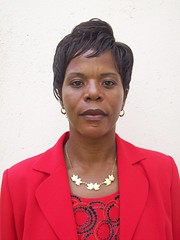
Biata Beatrice Nyamupinga is a member of parliament in the Republic of Zimbabwe. She is a member of the Zimbabwe African National Union-Patriotic Front (ZANU-PF) and has recently spoken out on gender issues and the constitution.
Originally uploaded by Pan-African News Wire File Photos
By Pamela Shumba in Bulawayo
Zimbabwe Herald
When Sipho Tshuma (not her real name) is told about a Constitution consultative meeting to be held in her community, she phones her husband in South Africa and asks for permission to attend.
Tshuma lives in Tsholotsho with her four children while her husband of 20 years has been in South Africa for the past five years.
As a "responsible" wife, Tshuma feels she should first inform her husband before she joins other community members to air their views about the country’s new supreme law.
The husband allows her to attend the meeting and not utter a word, then make a call to South Africa for an update on the meeting.
When she calls back, the husband tells her what to say in the next meeting although she has personal burning issues that she wishes to raise.
During the meetings she sits with other women on one corner while men organise themselves at the far end.
Women seem to be bound by cultural values that do not allow them to raise or debate issues in the presence of men.
Concerns raised at a recent workshop that was organised by Msasa Project in Bulawayo, showed that women were not fully participating in the consultative meetings.
Various stakeholders from the civic society and officials from the Ministry of Women’s Affairs, Gender and Community Development attended the workshop.
The objective of the workshop was to review progress so far in the constitution-making process vis-à-vis women’s issues.
It emerged that women in rural areas are shying away from the process.
Organisations representing women such as Msasa Project have expressed concern over the issue, saying a lot of work needs to be done in rural areas in educating women on their rights.
Some blamed the cultural set up in rural areas.
Copac teams also received their share of blame in failing to explain their mission to both men and women.
The Member of Parliament for Lupane West, Mr Martin Khumalo said women were coming in large numbers to the meetings but would often sit quietly.
"Women are coming to attend the meetings, but they do not have the courage to air their views. They leave men to do the talking," he said.
Msasa Project Bulawayo regional manager Mrs Bongie Sibanda said since women constituted 52 percent of Zimbabwe’s population, it was imperative to have their views.
"Most women there (in rural areas) do not even know what the current constitution says which makes it more difficult for them to contribute," said Mrs Sibanda.
The Bulawayo provincial development officer in the Ministry of Women’s Affairs, Gender and Community Development, Mrs Vaidah Mashangwa, added: "It seems women in rural areas are not aware of what to say.
"Rural women are being let down because sometimes when Copac teams hold meetings in their communities they do not even understand what the constitution is all about."
Historian and social analyst Mr Phathisa Nyathi said the problem in rural areas was patriarchy and could not be corrected overnight.
He said more time and resources were supposed to be given to outreach in rural areas with the civil society playing a big role in awareness campaigns.
"Civil society should have done this long before the consultative meetings.
"Men need education so that they encourage women to open up and contribute to the process," said Mr Nyathi.
No comments:
Post a Comment